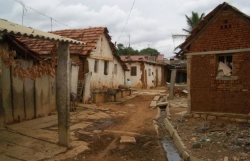|
Home | Blog| Sitemap | Privacy | Contact Us | ||

|
|
2.6 billion people worldwide lack access to clean water for drinking, cooking or basic sanitation, according to United Nations research. The economic – and social – impact is staggering. In India and South Asia, more than half the population consumes unsafe, contaminated and polluted drinking water. Due to poor water quality, the occurrences of intestinal diseases are widespread and households spend substantial portions of their meager income every year to cope with the diseases. Kolar District in Karnataka state is one of the poorest areas in South India. Safe, drinkable water is simply not widely available. There are no water treatment facilities in the area and bottled water is too expensive for most people to afford. Dissolved salts and minerals plus pathogens – microorganisms that carry disease – have contaminated much of the water. Where water is marginally acceptable in cases, the delivery system of village faucets and pumps allows household drinking water too many chances to be polluted between sources and point-of-use. Even water containers themselves become suspect sources of further pollution. Kemal Dervi, Administrator of the United Nations Development Programme, wrote in a Boston Globe editorial titled, "Access To Clean Water Should Be A Basic Human Right:"
It’s hard to believe one family in three in India struggles to put clean water on the table. But it’s true. In low-income communities throughout South Asia, dirty water is a fact of life. South Asia Pure Water Initiative, Inc. is out to change that.
|
|
| |
||||||


